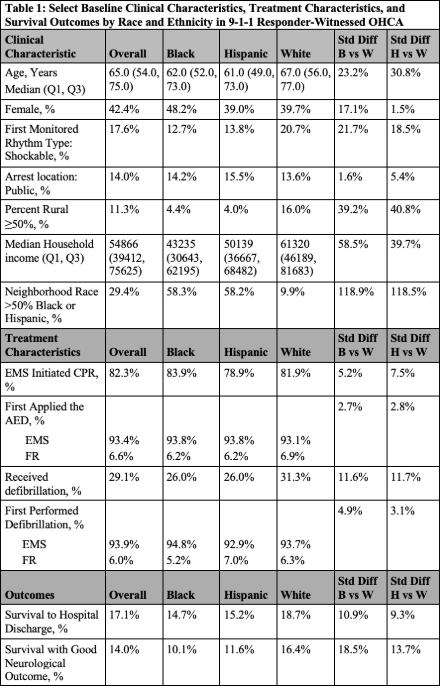Final ID: Sa704
Black and Hispanic Patients Have Lower Survival Outcomes Than White Patients in Out-of-Hospital Cardiac Arrests Witnessed by 9-1-1 Responders
Abstract Body: Introduction: In the U.S., patients of Black race and Hispanic ethnicity have lower survival from out-of-hospital cardiac arrest (OHCA) when they are not witnessed by 9-1-1 responders than White patients. Whether these racial and ethnic differences also exist for OHCAs witnessed by 9-1-1 responders (first responders and EMS) is unknown.
Hypothesis: For 9-1-1 responder-witnessed OHCAs, survival is lower among Black and Hispanic patients, as compared to White patients.
Methods: Using the Cardiac Arrest Registry for Enhanced Survival, we performed a national retrospective analysis of 9-1-1 responder-witnessed OHCA from 2013-2022. Descriptive differences by race and ethnicity were assessed by estimates by absolute standardized difference (%), with ≥10% indicating a meaningful difference. Multivariable logistic regression models with generalized estimating equations were used to quantify the association between race or ethnicity and survival outcomes.
Results: A total of 75,356 adult patients with OHCA witnessed by first responders or EMS identified as Black (31.6%), Hispanic (8.7%), or White (59.6%) were included. Black and Hispanic patients were younger, less likely to have a shockable rhythm, and more likely to be in lower income census tracts compared with White patients (Table). There were no important treatment differences observed with CPR or AED use, but Black and Hispanic patients were less likely to receive defibrillation (Table). Black patients had lower survival to hospital discharge than White patients (14.7% vs. 18.7%; aOR 0.86, 95% CI 0.81-0.91), whereas survival was similar for Hispanic vs. White patients (15.2% vs. 18.7%; aOR 0.92, 95% CI 0.84-1.00). However, both patients of Black race (aOR 0.71, 95% CI 0.66-0.76) or Hispanic ethnicity (aOR 0.85, 95% CI 0.78-0.93) had lower survival rates to discharge with good neurologic function than White patients.
Conclusion: Patients of Black race and Hispanic ethnicity have lower survival outcomes for 9-1-1 witnessed OHCAs, as compared to White patients. Whether this is due to unmeasured confounding from comorbidities or differences in care deserves further study.
Hypothesis: For 9-1-1 responder-witnessed OHCAs, survival is lower among Black and Hispanic patients, as compared to White patients.
Methods: Using the Cardiac Arrest Registry for Enhanced Survival, we performed a national retrospective analysis of 9-1-1 responder-witnessed OHCA from 2013-2022. Descriptive differences by race and ethnicity were assessed by estimates by absolute standardized difference (%), with ≥10% indicating a meaningful difference. Multivariable logistic regression models with generalized estimating equations were used to quantify the association between race or ethnicity and survival outcomes.
Results: A total of 75,356 adult patients with OHCA witnessed by first responders or EMS identified as Black (31.6%), Hispanic (8.7%), or White (59.6%) were included. Black and Hispanic patients were younger, less likely to have a shockable rhythm, and more likely to be in lower income census tracts compared with White patients (Table). There were no important treatment differences observed with CPR or AED use, but Black and Hispanic patients were less likely to receive defibrillation (Table). Black patients had lower survival to hospital discharge than White patients (14.7% vs. 18.7%; aOR 0.86, 95% CI 0.81-0.91), whereas survival was similar for Hispanic vs. White patients (15.2% vs. 18.7%; aOR 0.92, 95% CI 0.84-1.00). However, both patients of Black race (aOR 0.71, 95% CI 0.66-0.76) or Hispanic ethnicity (aOR 0.85, 95% CI 0.78-0.93) had lower survival rates to discharge with good neurologic function than White patients.
Conclusion: Patients of Black race and Hispanic ethnicity have lower survival outcomes for 9-1-1 witnessed OHCAs, as compared to White patients. Whether this is due to unmeasured confounding from comorbidities or differences in care deserves further study.
More abstracts on this topic:
A Simple One-Item Nursing Falls Assessment Predicts Outcomes For Patients With Stage D Heart Failure Undergoing Surgical Advanced Therapies
Salvador Vincent, Perez Jaime Abraham, Hudec Paige, Gorodeski Eiran, Oneill Thomas
At What Time Point is Delay to First Bystander Cardiopulmonary Resuscitation Not Associated with Survival for Out-of-Hospital Cardiac Arrest?O'keefe Evan, Nguyen Dan, Kennedy Kevin, Abdel Jawad Mohammad, Ikemura Nobuhiro, Chan Paul

